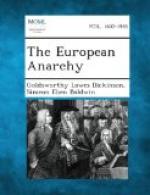But Europe is not the only scene of the conflict between empire and the balance. Since the sixteenth century the European States have been contending for mastery, not only over one another, but over the world. Colonial empires have risen and fallen. Portugal, Spain, Holland, in turn have won and lost. England and France have won, lost, and regained. In the twentieth century Great Britain reaps the reward of her European conflicts in the Empire (wrongly so-called) on which the sun never sets. Next to her comes France, in Africa and the East; while Germany looks out with discontented eyes on a world already occupied, and, cherishing the same ambitions all great States have cherished before her, finds the time too mature for their accomplishment by the methods that availed in the past. Thus, not only in Europe but on the larger stage of the world the international rivalry is pursued. But it is the same rivalry and it proceeds from the same cause: the mutual aggression and defence of beings living in a “state of nature.”
Without this historical background no special study of the events that led up to the present war can be either just or intelligible. The feeling of every nation about itself and its neighbours is determined by the history of the past and by the way in which that history is regarded. The picture looks different from every point of view. Indeed, a comprehension of the causes of the war could only be fully attained by one who should know, not only the most secret thoughts of the few men who directly brought it about, but also the prejudices and preconceptions of the public opinion in each nation. There is nobody who possesses these qualifications. But in the absence of such a historian these imperfect notes are set down in the hope that they may offer a counterpoise to some of the wilder passions that sweep over all peoples in time of war and threaten to prepare for Europe a future even worse than its past has been.
2. The Triple Alliance and the Entente.
First, let us remind ourselves in general of the situation that prevailed in Europe during the ten years preceding the war. It was in that period that the Entente between France, Russia, and England was formed and consolidated, over against the existing Triple Alliance between Germany, Austria, and Italy. Neither of these combinations was in its origin and purpose aggressive[1].




